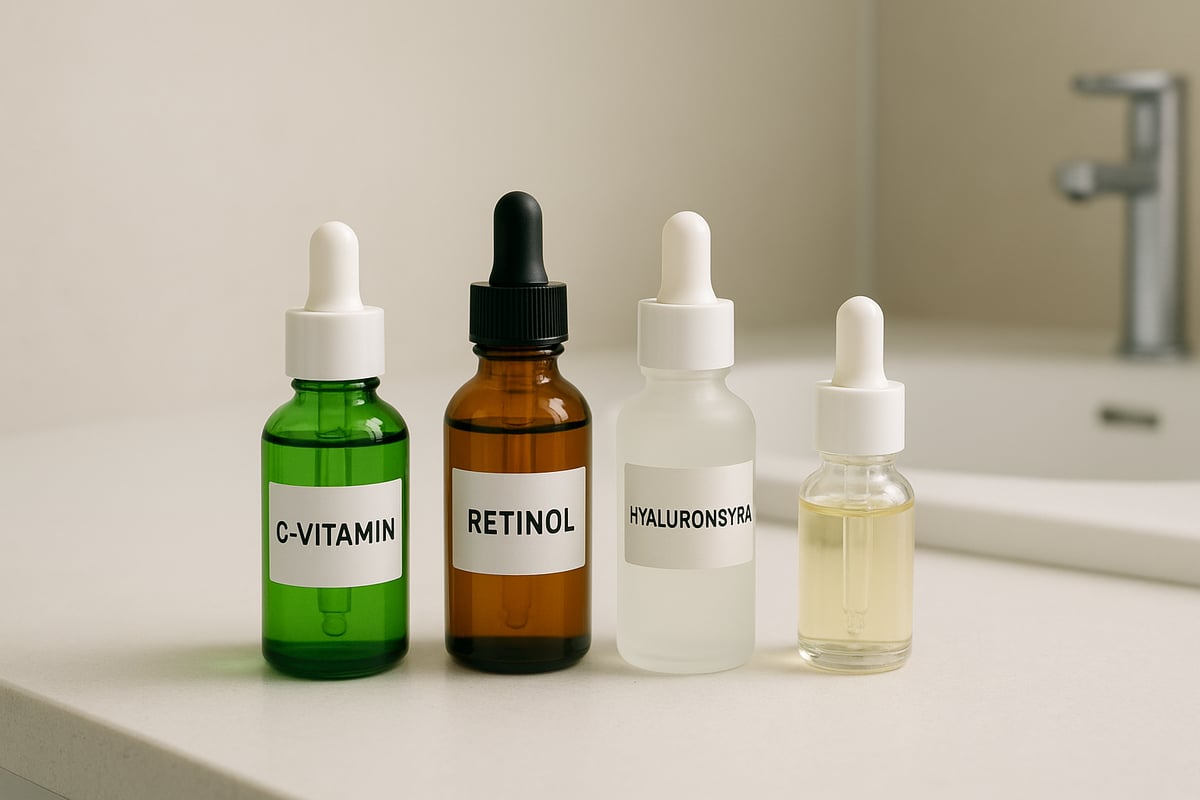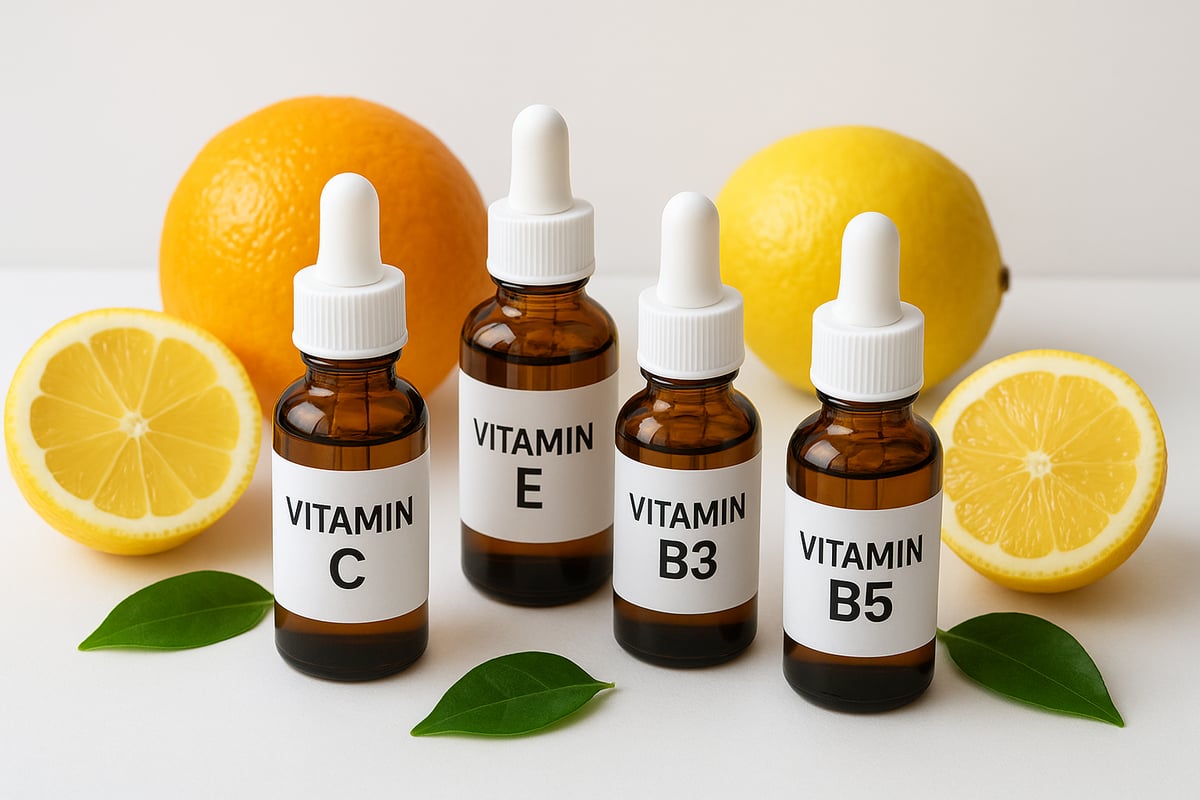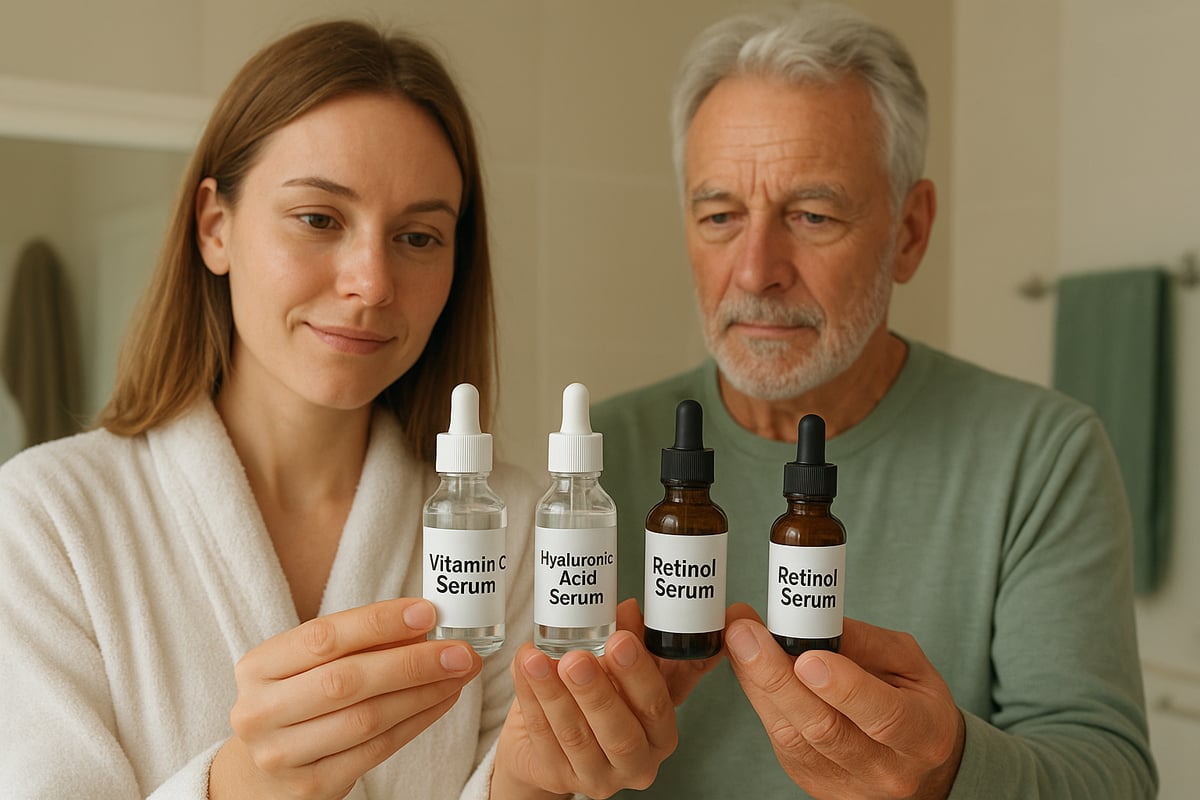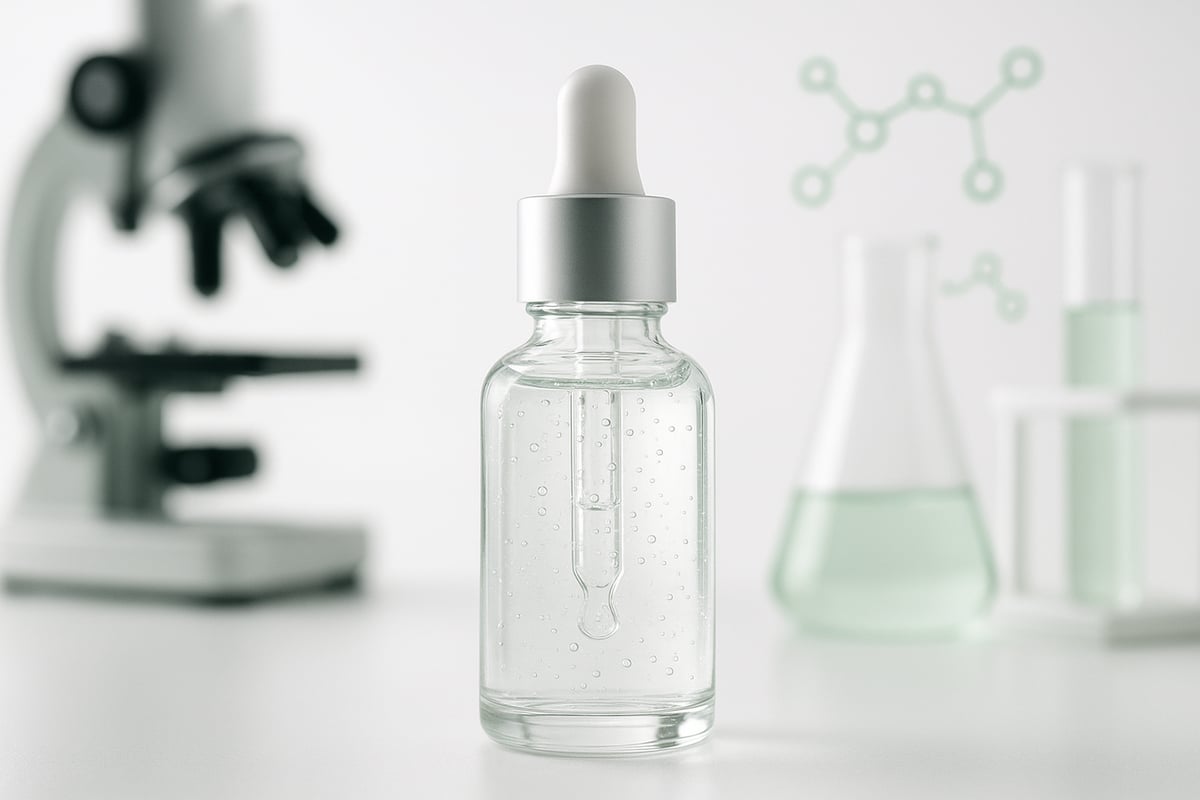The 2025 skincare revolution is here and the interest in serum vitamins has never been greater. More and more people are looking for effective solutions for healthier and more radiant skin. In this guide, you will learn everything about serum vitamins, from the latest science to how to find the right product for your skin type. Discover different serum types, important vitamins, trends and expert tips. Read on and take the first step towards becoming your own skincare expert.
What is a serum and why is it key to modern skincare?
Understanding why serum vitamins have become a staple in modern skincare requires a look at both science and everyday needs. Serums have taken their place in bathroom cabinets around the world thanks to their effective and targeted effects on the skin.

The role of serum in the skin care routine
A serum vitamin is a concentrated and easily absorbed formulation, specifically designed to deliver active ingredients deep into the skin. Unlike traditional creams, serums have much smaller molecules, allowing them to penetrate the top layers of the skin and reach the cells where they are needed most.
Serums are often used as a targeted treatment for specific skin concerns, such as pigmentation or fine lines. When you compare a vitamin C serum to a regular face cream, you will quickly notice the difference: the serum provides a faster and more noticeable effect thanks to its high concentration of active ingredients.
According to recent figures from Kicks, serum sales have increased by 20 percent in the past two years. Skin experts now recommend that all skin types, from dry to oily, benefit from at least one serum vitamin in their routine. Popular options include serums with vitamin C, retinol, and hyaluronic acid.
If you want to know more about different serum types and which ones suit different needs, you can read the Guide to Different Facial Serums for an overview and tips.
Benefits of using serum
There are several reasons why serum vitamins are celebrated in modern skincare. First and foremost, they give the skin an improved glow and more even skin tone thanks to their powerful ingredients. Serums also deeply moisturize, making them ideal even for those of you with dry or sensitive skin.
Serum vitamins protect against environmental aggressors and oxidative stress, reducing visible signs of aging such as wrinkles and age spots. Since serums often have a flexible formulation, they can be combined with other products in your routine for maximum effect.
An important scientific advantage is that serum vitamins contain active ingredients in higher concentrations than most other skin care products. This means you see results faster and more clearly. In addition, there are serums that are specifically adapted for sensitive skin, making them accessible to everyone.
In conclusion, serum vitamins are a key to modern skincare thanks to their deep action, targeted effect and scientifically proven benefits.
The most important vitamins in serum – effects and research
Choosing the right serum vitamin is crucial to achieving visible results in modern skincare. Vitamins in serum have different properties that can address specific skin concerns and contribute to healthier skin. Below we review the most central vitamins in serum, their effects and what the research shows.

Vitamin C: Antioxidant and glow booster
Vitamin C has become one of the most popular ingredients in serums due to its powerful antioxidant properties. It protects the skin from free radicals and UV damage, and stimulates collagen production, which can reduce the appearance of fine lines.
- Evens out pigmentation and provides increased radiance.
- Clinical studies show improved skin tone with daily use of vitamin C serum.
- Statistics from Kicks 2025 show that vitamin C serums are among the best-selling products.
- Example: Paula's Choice 25% Vitamin C + Glutathione Clinical Serum.
Research suggests that a vitamin C serum can produce visible results after a few weeks of regular use. For those who want to read more about the science behind and the many benefits of vitamin C serum , in-depth information is available.
Vitamin E: Protection and hydration
Vitamin E is another key component of serum vitamins and is known for its ability to strengthen the skin's barrier. It protects against environmental damage, such as pollution and UV radiation, while helping the skin retain its moisture.
- Works with vitamin C for increased antioxidant effect.
- Particularly effective for dry or sensitive skin.
- Example: Serum that combines vitamin C and E.
A serum vitamin with vitamin E helps reduce irritation and deeply moisturize the skin. This vitamin is often recommended for people with sensitive skin or for those who spend a lot of time outdoors.
Vitamin A/Retinol: Anti-aging and cell renewal
Vitamin A, in the form of retinol, has long been the gold standard in anti-aging. A serum vitamin with retinol stimulates cell renewal, reduces wrinkles and improves skin texture.
- Effective against both signs of aging and acne.
- Clinical studies show reduction in wrinkle depth after 12 weeks of use.
- Example: Retinol serum from Medik8 and The Ordinary.
A serum vitamin with retinol is especially suitable for those who want to work against aging or uneven skin texture. However, it is important to introduce retinol gradually and use sunscreen during the day.
Niacinamide (Vitamin B3): Multifunctional Skin Improver
Niacinamide, also known as vitamin B3, has quickly become a favorite in serum vitamins due to its versatile properties. It reduces redness, evens out skin tone, and regulates sebum production.
- Suitable for combination and acne-prone skin.
- Example: Niacinamide serum from The Inkey List.
- Can be combined with other vitamins for tailored effect.
By including a serum vitamin with niacinamide in your routine, you can effectively work against multiple skin problems at once, without irritating the skin.
Other vitamins and boosters in serum
In addition to the above, there are also other important ingredients in serum vitamins that can provide additional benefits:
| Vitamin | Effect | Example of use |
|---|---|---|
| B5 (Panthenol) | Soothes, moisturizes | Perfect for sensitive and dry skin |
| F | Strengthens the skin barrier | Often combined with B5 |
The trend is towards combination serum vitamins where several active ingredients work together to provide maximum results. The demand for serums with multiple vitamins is steadily increasing and more products are being adapted for different skin types.
In conclusion, serum vitamins offer a scientifically-based path to healthier, more radiant skin. By choosing the right combination of vitamins, you can tailor your skincare routine to meet your specific needs.
How to choose the right vitamin serum for your skin type and needs
Finding the optimal serum vitamin for your skin can feel overwhelming with all the choices on the market. A tailored strategy will yield the best results and minimize the risk of irritation. Below is a detailed guide to help you navigate the serum vitamin aisle, whether you’re a beginner or a skincare enthusiast.

Step-by-step guide: Find your perfect serum
Choosing the right serum vitamin starts with understanding your skin's unique needs. First, identify what skin type you have: is it dry, oily, combination, normal, or sensitive? This is crucial because some serum vitamins are better suited to specific skin types.
The next step is to map out your skin problems. Do you have age spots, dullness, fine lines or acne? Each serum vitamin has different strengths and suits different needs. If you want a more even skin tone and more radiance, a vitamin C serum may be the right choice. For anti-aging effects, serum vitamins with retinol are recommended.
Always review the ingredient list carefully. If you have sensitive skin, look for gentle formulations and avoid strong acids or perfumes. A good tip is to read reviews and look at clinical studies to ensure that the serum vitamin you choose delivers what it promises.
Also, choose the right concentration and formula. Serums are available as drops, capsules, boosters or oils. Adapt to the season: Vitamin C is especially good in the summer, while retinol is often used in the winter.
According to customer reviews from Kicks and Neostrata, a whopping 65% of users see noticeable improvements within four weeks when they choose the right serum vitamin. Remember, it's wise not to combine retinol and vitamin C in the same routine if you're a beginner, to avoid overloading.
Do you need extra support when choosing a serum vitamin for sensitive skin? Then you can get guidance from Skin Care for Sensitive Skin where you will find tips and product recommendations adapted to sensitive skin types.
Table: Skin problems and suitable vitamins
| Skin problems | Recommended vitamin | Examples of serum vitamins |
|---|---|---|
| Pigment spots | Vitamin C, niacinamide | Vitamin C Serum, Niacinamide Serum |
| Fine lines | Retinol, vitamin E | Retinol serum, Vitamin E serum |
| Dryness | Vitamin B5, hyaluronic acid | B5 serum, moisture serum |
| Sensitivity | PHA, vitamin B5 | PHA serum, B5 serum |
| Acne | Niacinamide, retinol | Niacinamide serum, retinol serum |
Examples of customized serum routines
Combining serum vitamins correctly can give you visible results faster. For pigment spots, a routine with vitamin C in the morning and niacinamide in the evening is recommended. This combo provides both radiance and a more even skin tone.
If you have mature skin, you can use retinol at night and vitamin E during the day. It strengthens the skin barrier and counteracts signs of aging. For those with sensitive skin, a routine with PHA and vitamin B5 is optimal, as these ingredients are gentle but effective.
Remember to always start carefully with new products. Test the serum vitamin on a small area of skin first and increase the amount gradually. If in doubt, professional advice at a salon or pharmacy can give you faster and safer results.
Finally, adapt your skincare routine to the season and your skin's condition. A serum vitamin can easily be combined with other products to suit you, but always listen to your skin's signals and adjust as needed.
The science behind serums: How they work in depth
Understanding how serum vitamins work on the skin requires insight into both biochemistry and modern skincare technology. Many wonder why these products produce such fast and visible results compared to traditional creams. Here you get a deep dive into the science behind the efficacy and safety of today's most advanced serum vitamins.

How serum ingredients affect the skin
What makes serum vitamins unique is their ability to penetrate the skin deeply. The molecules in serum are significantly smaller than in regular creams, which means they can transport active ingredients further down into the skin's layers.
The high concentration of ingredients in the serum vitamin provides an intense and targeted effect. For example, PHA (polyhydroxy acids) can strengthen the skin barrier while providing gentle exfoliation. Neostrata Vitamin C + PHA Serum combines antioxidant protection with barrier-strengthening properties, which is particularly effective against external stressors.
Antioxidants such as vitamin C and vitamin E protect skin cells against oxidative stress, which reduces the risk of premature aging. Research shows that vitamin C can inhibit the enzyme tyrosinase and thereby reduce hyperpigmentation. Combining different active ingredients, such as vitamins and acids, can create synergistic effects and enhance the result.
Another benefit of serum vitamins is their ability to hydrate quickly. Hyaluronic acid and PHA are two examples of ingredients that bind moisture and strengthen the skin's natural barrier. Many serums are absorbed in just a few seconds and provide a long-lasting, fresh feeling throughout the day.
Comparison table: PHA vs Hyaluronic acid in serum vitamin
| Property | PHA | Hyaluronic acid |
|---|---|---|
| Barrier strengthening | Yes | Yes |
| Rehydration | Means | Very high |
| Exfoliation | Mild | No |
| Suitable for sensitive skin | Yes | Yes |
Choosing the right serum vitamin with these properties can be crucial for both daily care and targeted skin improvement.
Safety and tolerance
When introducing a new serum vitamin into your routine, safety and skin tolerance are crucial. Modern serums are rigorously tested on different skin types and tones to ensure they are effective and gentle. Non-irritating formulations, like those from Neostrata, are gaining ground as more people seek products that are suitable for sensitive skin.
To avoid reactions, it is recommended to introduce new serum vitamins gradually. Start by using the product every other day and gradually increase. This gives the skin time to get used to the active ingredients and reduces the risk of irritation.
Tips for safe use of serum vitamin:
- Always read the ingredient list and avoid substances you know you react to.
- Do not combine too many strong active ingredients at the same time, especially if you are a beginner.
- Use sunscreen during the day, especially if your serum vitamin contains acids or retinol.
Research on active ingredients, such as retinol and vitamin A, has shown that proper use produces clear results without compromising skin health. If you want to delve deeper into safety aspects and effects, you can read more about Retinol and vitamin A in serum .
In summary, the effectiveness of serum vitamins is based on a combination of advanced technology, carefully selected ingredients, and scientifically proven methods. Understanding these factors will help you choose and use serum vitamins safely and effectively.
Trends and innovations in vitamin serum 2025
The skincare industry is set to experience a new wave of innovation in 2025, with serum vitamins playing a central role. The driving force behind this development is consumers’ increasing demands for effectiveness, sustainability and personalized solutions. Serum vitamin products are evolving rapidly to meet these needs, and new trends are shaping how we care for our skin every day.
New ingredients and combinations
Research into serum vitamins has led to the launch of advanced ingredient blends. Combination serums with vitamin C and PHA, EGF and various peptides have become increasingly common. Multifunctional boosters that contain both antioxidants and acids make it easier to tailor a skincare routine.
One example of innovation is capsule-based serums that provide precise dosing and protect the active ingredients until they are used. Exuviance and Elizabeth Arden have developed such solutions. Paula's Choice 7% Ectoin + Hyaluronic Acid Milky Hydrating Serum also illustrates the trend of a moisture and protection boost in a single serum vitamin.
The list of new combinations is growing:
- Vitamin C + PHA for radiance and barrier protection
- EGF + peptides for cell renewal
- Hyaluronic acid + ectoine for hydration
This development is clearly visible in this year's Skincare Trends 2025 according to ELLE , where innovation and multi-function are in focus.
Sustainability and natural ingredients
Consumers are now prioritizing sustainability and naturalness even in serum vitamins. The demand for organic and clean ingredients is increasing rapidly. Statistics from Kicks show that 40 percent of users prefer natural alternatives when choosing serum vitamins.
Eco-friendly packaging, recyclable materials and transparency around content are important factors. Several brands are investing in vegan formulas and FSC-certified packaging. It is becoming clear that sustainability is as important as performance when choosing a serum vitamin.
Examples of sustainable innovations:
- Biodegradable capsules
- Glass bottles with recyclable pipettes
- Natural preservatives
Customization and personalization
Personalized skincare is the next big step for serum vitamins. Consumers are now able to tailor their products based on skin type, genetics and lifestyle. Digital skincare advisors and apps analyze skin needs and suggest the optimal serum vitamin.
Tailored solutions are based on advanced technology, sometimes even DNA analysis. This allows serum vitamins to be customized to provide maximum results and minimal irritation. Personalization also means you can track your skin's progress over time and adjust products as needed.
Price development and availability
The serum vitamin market is becoming increasingly inclusive. There are now products for all budgets, from The Ordinary's serum for under 100 kronor to exclusive brands like iS Clinical for over 2,400 kronor. The premium segment is growing, but budget options still maintain high quality.
Consumers can easily find a serum vitamin that suits their budget and needs. Increased competition is driving innovation and accessibility, so more people have the chance to access advanced skin care. Regardless of the price point, it is possible to find a serum vitamin with proven efficacy and modern ingredients.
How to use serum with vitamins – best routine for maximum effect
Using serum vitamins correctly is crucial to really seeing a difference in your skin's radiance, texture and strength. Whether you're a beginner or an experienced user, a well-thought-out routine can maximize the effect of every drop. The right application and order allows active ingredients to penetrate deeper and produce results faster.
The optimal serum routine step by step
To get the most out of your serum vitamin, follow a simple but effective routine:
-
Cleanse the skin thoroughly
Apply serum vitamin to clean, dry skin for best absorption. -
Apply the right amount
Two to three drops are enough for the face and neck. Massage in gently with your fingertips. -
Allow the serum to absorb.
Wait a minute before applying moisturizer. Serum vitamins are quickly absorbed thanks to their small molecules. -
Use at the right time
Vitamin C-based serums are great for the morning, as they protect against free radicals and UV damage. Retinol serums are best used in the evening. -
Finish with cream and sunscreen
Seal the effect with a moisturizing cream and use sunscreen during the day, especially if your serum vitamin contains active ingredients that can make the skin more sensitive to the sun.
One tip is to keep your routine simple and focused. The trend of skinimalism, where multifunctional products combine serum, moisture and SPF, is growing rapidly and makes it easier to get results without overloading the skin. Read more about this in the article about Skinimalism and multifunctional skincare products .
Common mistakes and how to avoid them
Many people use too much serum vitamin, which can irritate the skin instead of providing better effect. Another mistake is to apply serum vitamin after the cream, which reduces absorption.
- Too much product can overload the skin.
- The wrong order reduces the effect.
- Forgetting sunscreen when using active ingredients can lead to sensitivity.
By following the steps above, you will avoid the most common pitfalls and get the maximum benefit from your serum vitamin.
Tips for best results
Always combine serum vitamins with a moisturizing cream to lock in moisture. Listen to your skin's signals and adjust your routine according to season and needs. Many see increased radiance and more even skin tone after just a few weeks, according to customer reviews from both Neostrata and Kicks.
Always follow the manufacturer's instructions and avoid mixing too many active ingredients at once if you are sensitive. A consistent routine with the right serum vitamin is key to long-term results.
Expert Tip: Maximize the Effect of Your Vitamin Serum
Getting the most out of your vitamin serum requires both knowledge and strategy. By thinking holistically about your skincare routine, customizing products, and following proven tips, you can see clear results and long-lasting improvements in your skin's health.
Choose the right serum vitamin for your lifestyle and skin type
Choosing the right serum vitamin is all about understanding your skin's unique needs. Factors like age, climate, and daily routines affect which vitamins and concentrations are best for you.
Younger people can start with a lighter vitamin C serum to protect against oxidative stress and give the skin a glow. If you have mature skin, retinol is an excellent choice to stimulate cell renewal and reduce the appearance of lines. Sensitive skin often feels better with serum vitamins with B5 or PHA, which soothe and strengthen the skin barrier.
Skin therapists recommend starting with a low concentration of serum vitamin and gradually increasing the dose. Always adjust according to the season, for example, vitamin C serum is optimal in the summer while retinol is better suited in the winter.
If you want to be extra precise, you can use digital skin analysis tools that offer personalized recommendations. Read more about how technology is revolutionizing the ability to customize your skincare in this article on Personalizing Skincare Through Technology .
Combine serum vitamin with other skin care products
To maximize the effects of your serum vitamin, it is important to build a complete and balanced skincare routine. Serum vitamins usually work best when applied to cleansed skin, followed by a moisturizer and sunscreen.
Avoid using serum vitamins with retinol and vitamin C in the same routine if you are new to this, as the combination can cause irritation. Niacinamide, on the other hand, is compatible with most serum vitamins and can contribute to a more even skin tone.
Here is an example of an effective routine:
- Morning: Cleanser, serum vitamin with vitamin C, moisturizer, sunscreen.
- Evening: Cleansing, serum vitamin with retinol (or B5 for sensitive skin), night cream.
Never combine several strong active ingredients without first testing tolerance. Always read the product instructions carefully before introducing a new serum vitamin into your routine.
Shelf life and storage
Serum vitamins are sensitive to light and oxygen, which can affect their effectiveness. Always store serum vitamins in their original packaging, preferably in a dark and cool place, to protect the active ingredients.
Vitamin C serum can sometimes darken slightly over time, but this does not necessarily mean that the product has lost its effectiveness. However, you should discard the vitamin serum if it smells bad or has changed its consistency significantly.
Tips for longer durability:
- Always screw the lid on tightly.
- Avoid storing serum vitamins in humid environments such as the shower.
- Use a pipette or pump to minimize exposure to air.
Through proper storage, you ensure that your serum vitamin maintains its strength and provides optimal effect throughout the entire period of use.
Frequently asked questions and answers about serum vitamins
How long does a serum vitamin last?
Most serum vitamins last between 2–3 months with daily use. This varies depending on dosage and package size.
Can I use serum vitamins all year round?
Yes, but adjust the type of serum vitamin according to the season and skin needs. For example, vitamin C is extra good in the summer, while retinol is suitable in the winter.
Is serum vitamin safe for sensitive skin?
Always choose gentle formulations and start carefully. Serum vitamins based on B5 or PHA are often good choices for sensitive skin.
How quickly will I see results?
Many people experience improvements in skin tone and radiance after just 2–4 weeks of using the right serum vitamin. For anti-aging effects, it can take longer, often up to 12 weeks.
Investing in knowledge and the right serum vitamin is the key to a skincare routine that really makes a difference.
Now that you have a deeper understanding of how vitamin serums can transform your skincare routine and why natural ingredients make a difference, you may be curious to discover the best options for yourself. At Éclore, we have selected serums that provide both radiance and balance, regardless of skin type or need. With a focus on nutrition, effectiveness and sustainability, you can feel confident in your choice of products that really make a difference for your skin. Want to explore our handpicked range and find your next favorite serum?


